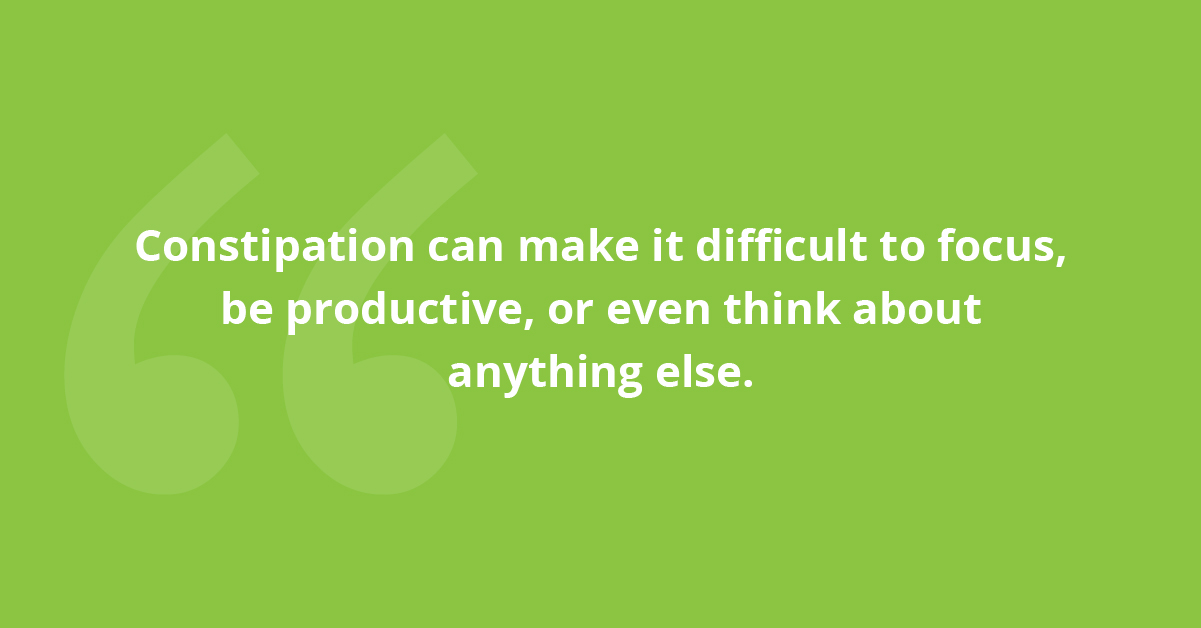Most of us have uttered the phrase that we’re “stuck at work” at some point. Usually, we say it to express that we’re working past our normal schedule, or powering through a big project or late meeting. But for many people with digestive diseases such as inflammatory bowel disease (IBD), irritable bowel syndrome (IBS), celiac disease and other gut issues, being “stuck at work” can have an even more uncomfortable meaning.

Constipation may not be a four-letter word, but it can sure make a person feel like saying a few. When we’re constipated, it’s hard to focus, be productive, enjoy activities, or even think about anything else. In fact, constipation may even be linked to poor sleep.
In this post, GIThrive’s Nutrition Team shares three top constipation-easing tips to help get things moving again and possibly reduce the chance of workplace constipation.
Tip 1: Get Fiber in Your Diet
Most of us know fiber helps prevent constipation. The benefits of fiber appear to be most pronounced with soluble fiber, including psyllium husk, rather than insoluble fiber such as bran. Be careful with bran—it may actually make discomfort worse by increasing abdominal distention and gassiness.

Start increasing fiber by tracking what you eat for a few days and see how your average daily fiber intake stacks up. You may need to consider supplementing with over-the-counter fiber supplements such as methylcellulose (Citrucel®), which tends to be gentler and avoid bloating. You can also add in fiber-rich snacks like a handful of pumpkin seeds and dried fruit, or a fruit-and-veggie smoothie.
In addition, don’t forget to drink plenty of water. Water keeps digestion moving along and it will also help the additional fiber to go down a lot better. So, go ahead: make another trip to the water cooler.
Tip 2: Move Your Body
Sitting at your desk all day can make constipation worse, which can have ripple effects on mood, productivity, and overall health. Exercise can help. Studies have shown exercise can not only trigger the release of mood-boosting endorphins, but can also ease uncomfortable constipation symptoms and even speed up digestion. Aerobic exercise (aka cardio) has been shown to help get things moving through the GI tract faster. As food and waste move through your system faster, stool is softer and easier to pass.
If you’re not feeling up for a full workout, even walking can help. Take several breaks to walk around the office, to stop by the water cooler (refill that glass of H2O, as we mentioned earlier!) or take the stairs instead of the elevator.
Even just standing up at your desk frequently can make a difference. If you’re not able to get a standing or convertible desk, try setting a timer to get up once an hour if you’re busy on a project. Change your position and do a couple of light stretches if possible.
Tip 3: Take a Breath Break
Did you know stress can make you constipated? It’s true. Being in stressful situations puts a tremendous impact on your body. It’s tied in to the survival instinct. Your body directs energy to the mechanisms and systems that will enable you to “fight or flee” a situation.
The fight-or-flight response can be useful to us in a dangerous situation. Think for example, if you were running away from a lion—it wouldn’t be the best time to relax and make a pit stop. High levels of stress can slow down your bowels and make it more difficult to go; after all, digestion takes a back seat when survival is the primary concern. But everyday stress isn’t usually related to survival. Taking steps to better manage stress goes a long way for better digestive health. (Check out our on-demand webinar on managing stress by clicking below.)
Another issue with stress: Stress eating. Most people don’t crave a salad when they’re dealing with stress: the tendency is to go for something fatty. These so-called “comfort food” choices that help to sooth stress aren’t helping the bowels either. Learn more about how to make healthier food choices when you’re feeling emotional by clicking here.
To help lower stress’ impact on the body, take a few minutes from your day to take a breather. Get your body out of that “run” mode and into a more relaxed and ready-to-digest mode. Bonus points if you do this before a meal. There are several apps like Calm and iBreathe to help guide you through breathing exercises, or you can check out one offered by our team at Vivante if you don’t know where to start.
When to Call Your Doctor
Some features of constipation may be alarming and warrant a discussion with your healthcare provider. These include a family history of colorectal cancer, rectal bleeding, unintentional weight loss or anemia.
While most cases of constipation are routine, having your antenna up and listening to your body can help to avoid serious problems.
Special thanks to the GIThrive Nutrition Team for contributing to this post.







